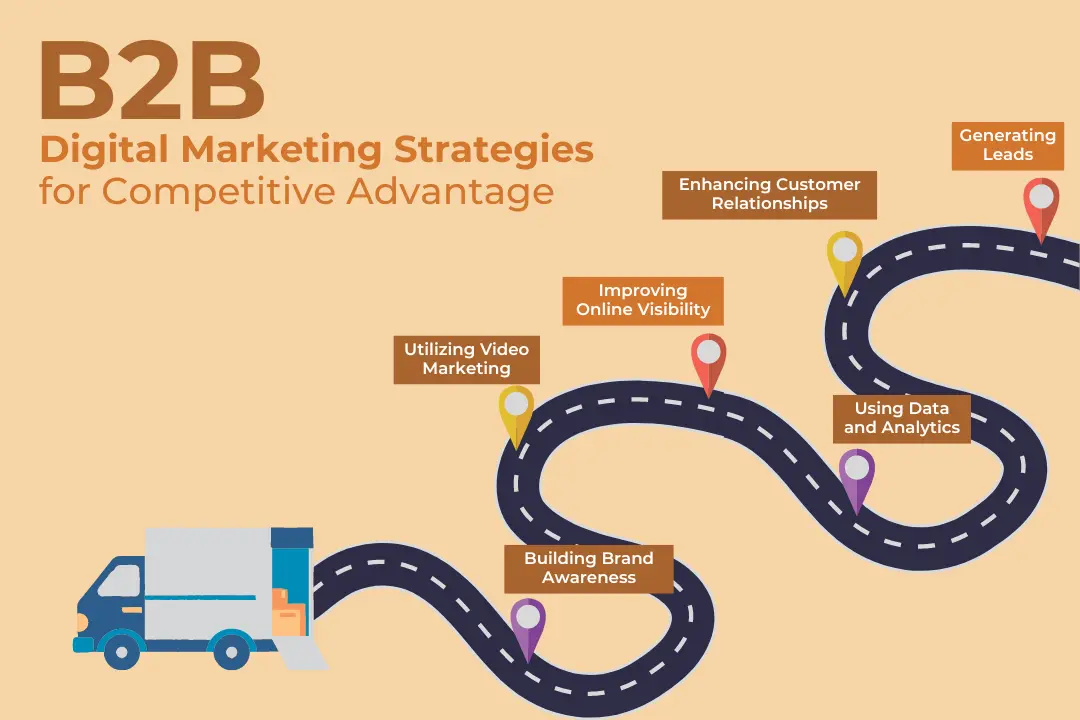Introduction
In today’s fast-paced digital world, the integration of digital marketing with supply chain management is important for achieving business success. Digital marketing plays a pivotal role in optimizing supply chain processes, enhancing customer satisfaction, and driving business growth.
This article explores how digital marketing impacts supply chain success and highlights the key strategies that leading B2B marketing firms employ to achieve these goals.
Highlights:
- B2B Digital Marketing Strategies for Competitive Advantage
- 1. Improving Online Visibility
- 2. Building Brand Awareness
- 3. Generating Leads
- 4. Enhancing Customer Relationships
- 5. Leveraging Data and Analytics
- 6. Utilizing Video Marketing
Digital Transformation in Supply Chain Management
Digital transformation has revolutionized supply chain management, enabling companies to optimize operations and respond swiftly to market demands. By utilizing digital marketing strategies, businesses can streamline logistics, improve efficiency, and enhance supply chain optimization.
Additionally, digital marketing boosts brand awareness and helps maintain a strong online presence. By leveraging content marketing, social media, and targeted advertising, companies can reach wider audiences and establish their brand in competitive markets.
Leading B2B marketing firms specialize in creating compelling strategies that resonate with target audiences, ensuring sustained brand visibility and competitive edge.
Utilizing Market Analytics and Data-Driven Decisions
Market analytics are critical for achieving supply chain success, enabling companies to analyze trends and customer behaviors for informed decision-making. B2B Digital marketing equips businesses with tools and insights to understand these trends and modify strategies accordingly.
Accurate demand forecasting is vital for supply chain optimization. Digital marketing strategies, such as CRM (Customer Relationship Management) systems and data-driven analytics enable companies to predict customer demand more accurately.
This foresight helps businesses manage inventory efficiently, reduce costs, and improve customer satisfaction.
B2B Digital Marketing Strategies for Competitive Advantage
In B2B, digital marketing strategies boost competitiveness by focusing on targeted approaches. They help increase brand visibility, generate leads, and engage clients, leading to long-term growth.
Following are the strategies that B2B businesses can adapt to have a competitive advantage:

1. Improving Online Visibility :
Ensure your website is user-friendly and optimized for search engines (SEO). This helps potential clients find you easily when searching for supply chain services.
Create valuable content (blogs, articles, videos) that addresses common industry problems and showcases your expertise. This can attract and engage potential customers.
2. Building Brand Awareness :
Use platforms like LinkedIn, Facebook, and Twitter to share industry news, company updates, and engage with your audience. This helps build a strong online presence and brand recognition.
Send regular newsletters and updates to your clients and prospects. This keeps your brand top-of-mind and nurtures relationships.
3. Generating Leads :
Run targeted ads on Google and social media to attract potential clients who are actively searching for supply chain solutions. Offer free resources like eBooks, whitepapers, or webinars in exchange for their contact information. This helps you build a list of potential leads to follow up with.
4. Enhancing Customer Relationships :
Use CRM software to track interactions with clients and automate follow-ups. This ensures timely communication and improves customer satisfaction.
Use data and analytics to personalize your marketing messages based on customer behavior and preferences. This can improve engagement and loyalty.
5. Using Data and Analytics :
Use analytics tools to monitor the performance of your marketing campaigns. This helps you understand what’s working and what needs improvement.
Analyze data to gain insights into customer needs and behaviors. This can guide your marketing strategies in the right direction and help you make informed decisions.
6. Utilizing Video Marketing :
Create videos that explain your services and how they can benefit potential clients. This can make complex information more digestible and engaging.
Share video testimonials from satisfied clients. This builds trust and credibility with potential customers.
How Can The 4P Solutions Help Supply Chain Business Adapt Digital Marketing and Achieve Success?
Our team at The 4P Solutions provides tailored digital marketing services for supply chain businesses that can help achieve significant results. Our services have helped businesses enhance their online presence and achieve success in the digital landscape.
Below is a list of our expertise and how it can benefit your Supply Chain business:
1. Search Engine Optimization (SEO) :
The 4P Solutions’ B2B SEO services can enhance supply chain businesses’ online visibility by optimizing their websites for relevant keywords, driving organic traffic and attracting potential customers searching for related products/services.
2. Social Media Marketing (SMM) :
We can create and manage B2B social media campaigns for supply chain businesses, facilitating engagement with their target audience, spreading valuable content, and effective promotion of products/services.
3. Pay-Per-Click (PPC) Advertising :
We can design and manage PPC campaigns for your businesses using PPC advertising, driving increased website traffic, higher conversion rates, and improved ROI for immediate results.
4. Content Marketing :
We can help craft tailored content strategies, including blog posts, articles, infographics, and videos, to establish authority in the supply chain industry, enhancing online presence and building trust among potential customers.
5. Email Marketing :
We can create personalised email campaigns for your business, delivering relevant content, promotions, and updates to subscribers’ inboxes thereby nurturing leads, retaining customers, and driving repeat business through ongoing communication.
6. Website Design and Development :
We provide tailored website design and development services for businesses, ensuring user-friendly and responsive designs optimized for search engines and incorporating necessary e-commerce functionalities.
7. Analytics and Reporting :
We offer comprehensive analytics and reporting services for supply chain companies, enabling them to monitor online performance, identify areas for improvement, and optimize strategies with data-driven decisions.
By optimum usage of these digital marketing services from The 4P Solutions, supply chain businesses can effectively enhance their online presence, reach a wider audience, and ultimately achieve greater success in the competitive digital world.
Conclusion
Digital marketing is integral to the success of modern supply chains. By leveraging digital transformation, market analytics, and effective marketing strategies, companies can optimize their supply chain operations, enhance customer satisfaction, and achieve business growth.
Leading B2B marketing firms and Professional B2B web design companies play a vital role in helping businesses navigate the complexities of the digital landscape and stay ahead of the competition. Adapting digital marketing is not just a trend, it is a necessity for achieving supply chain success in today’s competitive market.
FAQs
Analytics and reporting provide valuable insights into the performance of digital marketing strategies, allowing supply chain businesses to track progress, identify areas for improvement, and make data-driven decisions to optimize their efforts.
A well-designed and user-friendly website enhances the online experience for customers, increases credibility, and encourages conversions for supply chain businesses.
Long-term benefits include sustained brand visibility, increased customer loyalty, higher ROI, scalability, and the ability to adapt to market changes, positioning supply chain businesses for continued growth and success in the digital era.
Challenges may include limited resources, technological constraints, data privacy concerns, and adapting to rapidly evolving digital landscapes, which require careful planning and execution of digital marketing initiatives.

